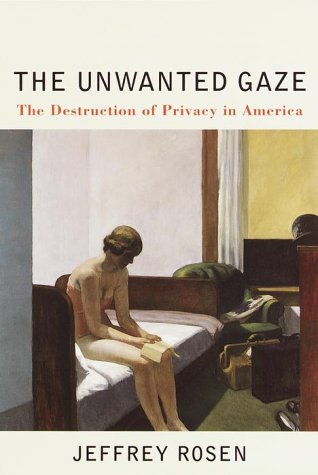I bought this looking for some insight into the increasingly popular privacy movement. I got what I was looking for, but it wasn't a GREAT book, just a good book.
I bought this book expecting something more than opinion on database policy, and was never able to force myself to finish it. I found no evidence that the author has ever realized that coercive, devastating assaults on our privacy can be conducted by our neighbors, friends, and co-workers using radio technology and other covert surveillance devices.
Let me get my two main criticisms of Rosen's book out of the way first: 1) I am not a legal scholar (or a lawyer), and found the book to be a little too technical, even somewhat tedious at times, although it is basically well written and even impassioned; and 2) I also thought the book focused somewhat obsessively on one particular privacy-related issue ("sexual harassment"), and specifically the argument that much of what we classify as sexual harassment would be better dealt with as "invasion of privacy." I felt like this could have been summarized in a few pages and not have taken up half the book!
Ever wonder why Monica Lewinski's private life could be held up to public scorn when she was never charged with a crime nor was even the target of a law suit? Ever wonder what has happened to the 4rth amendment's protection against unreasonable searches and seizures?
Jeffrey Rosen, author of THE UNWANTED GAZE (2000), went to Harvard College, Oxford U. (Balliol College....
The best thing about this book is that the author points out Vice President Al Gore called for an "electronic bill of rights" in 1997, showing yet again that Gore is in touch with the technological age--its benefits and its hazards. Gore believes we citizens "should have the right to choose whether your personal information is disclosed.
The author finds our privacy under assault by the courts, by new technology, and by changing cultural attitudes. He uses this book to show that we have less privacy now than people did in the United States in the 18th and 19th centuries, and that we will soon have even less unless new approaches are designed.
We owe Jeffry Rosen an enormous debt for joining issue on a matter of vital importance to the future of America.As we rush headlong into a new but uncertain age, it is becoming increasingly clear that in our zeal to promote the marvels of the Internet, we may be seriously eroding the fundamental rights of the average citizen and consumer.
Jeff rosen has helped us join issue on a matter of vtal public concern to all Americans.It is becoming increasingly clear that in our zeal to promote the marvels of the Internet, we may be seriously eroding the fundamental rights of the average citizen and consumer.
Brilliantly argued, beautifully written, this book changed my life and the way i see the world. i never realized the relentless, often unobservable invasions of privacy all around me.
Unfortunately, the author has a very limited and single-minded approach. He seems unable to fully investigate or accept issues in a way that would most inform and assist readers.
Found Rosen's appearance on CSpan to discuss this book a bit of a put off in regard to reading it. He's hot to trot on Lewinski's computer but made no mention of The Defense Dept.
I have a problem with the subtitle ("The Destruction of Privacy") because my definition of privacy seems to be more inclusive than is Rosen's. He is quite correct when expressing concern about what we both view as abuses of the Fourth Amendment, especially in recent years because of the WWW.
